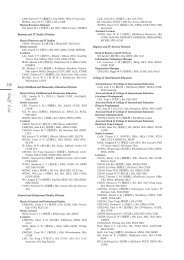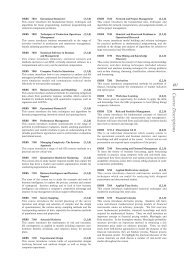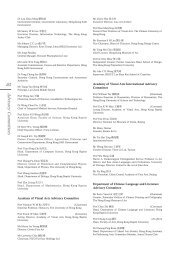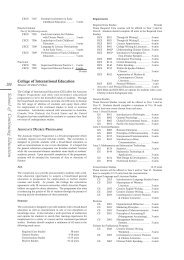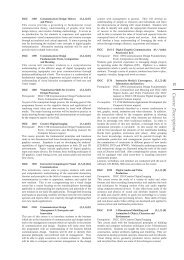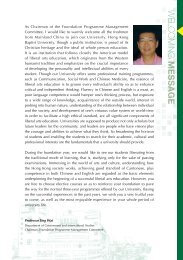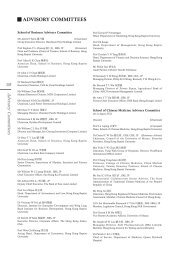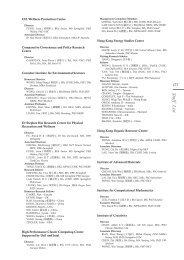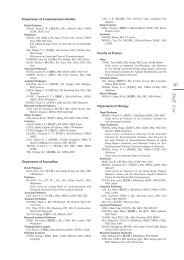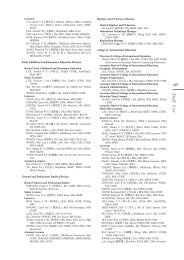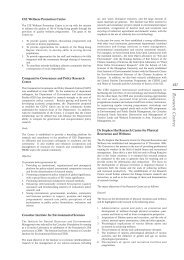308<strong>Course</strong> <strong>Descriptions</strong>ECON 3260 Chinese Economic Developments (3,3,0) (E)Prerequisite: ECON 1210 Principles of Microeconomics orECON 1220 Principles of Macroeconomicsor ECON 1620 Basic Economic Principles orequivalentThis course provides an overview of the Chinese economicdevelopments. Emphases will be placed on how the mainlandChina has emerged as an important economic power in the worldsince she adopted economic reforms and open-door policies in1978 and how she has gradually integrated with Taiwan and<strong>Hong</strong> <strong>Kong</strong>. A useful economic background will be provided tostudents who may be prepared to engage in China business in thefuture.ECON 3580 Honours Project (3,*,*)The student project is a valuable integrative element in the BSocSccurriculum, providing a focus for the application of knowledgeacquired from core and major courses. The project provides anopportunity for students to apply the knowledge and skills gainedon the degree programme to a real and practical economic issuerelated to China, and to prepare themselves for the transfer fromthe academic to the work situation.ECON 3620 Economic Development (3,3,0) (E)Prerequisite: (1) ECON 1210 Principles of Microeconomics and(2) ECON 1220 Principles of Macroeconomics orECON 1620 Basic Economic PrinciplesThis course covers major theories of economic growth anddevelopment. It aims to introduce and analyse the commonproblems facing less developed economies. Strategies and policyrecommedations for sustainable economic development will bediscussed. This course intends to provide students with a solidtheoretical foundation to appraise the strategies and performancesof economic development.ECON 3630 Labour Economics (3,3,0)Prerequisite: ECON 1210 Principles of Microeconomics orECON 1620 Basic Economic PrinciplesThis course aims to provide an understanding of the working ofthe labour market in an economy. It seeks to describe, theorise,and analyse the behaviour of the labour market. Issues ofinvestment in human capital (education and on-the-job training),wage differentials and discrimination are discussed. Applicationsof concepts and theories in the area of human resources andpersonnel economics (labour turnover, labour mobility andincentive pay schemes) are also presented. To enhance theunderstanding and the application of labour economics theories,training on data analysis and knowledge of analytical tools areprovided.ECON 3650 Public Finance (3,3,0) (E)Prerequisite: ECON 1210 Principles of Microeconomics orECON 1620 Basic Economic PrinciplesThis course aims at analysing the economics of public sector.Fiscal objectives, instruments and constraints, as well as conceptsand theories of public finance will be discussed, mainly froma positive perspective. Considerations will also be given to theeconomic impacts from the political interactions of interestgroups. The analytical tools, models and applications to the realworld public sector problems are emphasized.ECON 3670 Economic and Business Forecasting (3,3,0) (E)Prerequisite: ECON 2170 Applied Econometrics or ECON 3250Econometric Analysis for Business or equivalentThis course aims to introduce quantitative methods andtechniques for time series modelling, analysis, and forecasting ofeconomic and business data. Topics include time series propertiesof fluctuation, cycle, seasonality, trend, and unit roots tests forstationary. Models such as autoregressive and distribution lags,moving average and exponential smoothing, ARIMA, VAR andError Correction (EC), ARCH and GARCH, Logit and Probitmodels will be discussed with both statistical theory and practicalmethods of model building and analysis. Emphasis will alsobe put on the applications in economic and business relatedareas. Computing is an integral part of this course, all studentsare required to do data analysis, modelling and forecasting withcomputer statistics software.ECON 3710 China’s Foreign Economic (3,3,0) (P)Relations and TradePrerequisite: ECON 1210 Principles of Microeconomics orECON 1220 Principles of Macroeconomicsor ECON 1620 Basic Economic Principles orCHES 2220 Foundations of Chinese Economy orECON 3110 International EconomicsThis course aims to introduce students the basic features andeconomic impacts of China’s foreign economic relations andtrade, with emphasis on reform and changes in the post-1978period. The first part of the course provides a theoretical as wellas empirical framework for analysis of China’s foreign tradeissues. The second part of the course examines and assessesrecent developments of foreign investment in China.ECON 3720 Industrial Management and (3,3,0) (P)Development in ChinaPrerequisite: ECON 1210 Principles of Microeconomics orECON 1220 Principles of Macroeconomics orECON 1620 Basic Economic PrinciplesThe course aims to develop students’ knowledge of the industrialsector of the Chinese economy, placing particular emphasis onthe reform experience of the industrial enterprises in the country.Special effort will be put on analysing the recent emergenceof private enterprises in the industrial sector. The course willdiscuss how this change came about and its likely impacts onthe economic development of the country. The final part of thecourse will discuss the difficulties facing the country in upgradingits industrial structure. Some international experience will bedrawn on making policy recommendations.ECON 3730 Money and Finance in China (3,3,0) (P)Prerequisite: CHSE 2220 Foundations of Chinese Economy orECON 2130 Money and BankingThis course aims at fostering an understanding of the functionsand the administration of money and finance in mainland China,and their impact on the economy at both the micro and themacro levels. Fiscal, monetary and exchange rate systems willbe analysed from optimality as well as policy viewpoints. Thedevelopments of the post-1979 and post-1994 financial reformsand their policy implications will be emphasized. Financialrelations between the Mainland and <strong>Hong</strong> <strong>Kong</strong> will also beinvestigated.ECON 3740 Economics of Human Resources (3,3,0) (E)Prerequisite: ECON 1210 Principles of Microeconomics orECON 1620 Basic Economic PrinciplesThis course aims to provide an understanding of the humanresources market and its related issues. It seeks to describeand analyse the behaviour of the human resources marketfrom an economic perspective. Issues of investment in humanresources (education and on-the-job training), pay differentialsand discrimination in the workplace are discussed. Concepts inthe area of human resources, such as work incentive schemes,payment methods, and employer and employee relationship, arealso presented. To enhance the understanding and applicationof the concepts, training on data analysis and knowledge ofanalytical tools are provided.ECON 4005 China’s Foreign Economic (3,3,0) (P)Relations and TradePrerequisite: CHSE 1005 Essentials of Economics or ECON1005 Principles of Economics I or ECON1006Principles of Economics II or ECON 1007 BasicEconomic PrinciplesThis course aims to introduce students the basic features andeconomic impacts of China’s foreign economic relations andtrade, with emphasis on reform and changes in the post-1978
period. The first part of the course provides a theoretical as wellas empirical framework for analysis of China’s foreign tradeissues. The second part of the course examines and assessesrecent developments of foreign investment in China.ECON 4006 Economic and Business (3,3,0) (E)ForecastingPrerequisite: ECON 3005 Applied Econometrics or equivalentThis course aims to introduce quantitative methods andtechniques for time series modelling, analysis, and forecastingof economic and business data. Topics include time seriesproperties of fluctuation, cycle, seasonality, trend, unit roots testsfor stationary. Models such as autoregressive and distributionlags, moving average and exponential smoothing, ARIMA, VARand Error Correction (EC), ARCH and GARCH, Logit andProbit models will be discussed with both statistical theory andpractical methods of model building and analysis. Emphasis willalso be put on the applications in economic and business relatedareas. Computing is an integral part of this course, all studentsare required to do data analysis, modelling and forecasting withcomputer statistics software.ECON 4007 Money and Finance in China (3,3,0) (P)Prerequisite: CHSE 2005 Foundations of Chinese Economy orECON 1006 Principles of Economics II or ECON1007 Basic Economic PrinciplesThis course aims at fostering an understanding of the functionsand the administration of money and finance in Mainland China,and their impact on the economy at both the micro and themacro levels. Fiscal, monetary and exchange rate systems willbe analyzed from optimality as well as policy viewpoints. Thedevelopments of the post-1979 and post-1994 financial reformsand their policy implications will be emphasised. Financialrelations between the Mainland and <strong>Hong</strong> <strong>Kong</strong> will also beinvestigated.ECON 7020 Economic Developments in China (2,3,0)and <strong>Hong</strong> <strong>Kong</strong>This course aims to provide students with a systematicunderstanding of the system and performance of the Chineseand <strong>Hong</strong> <strong>Kong</strong> economies since 1949 respectively. Adopting ahistorical and topical approach, this course focuses on the policyissues of reform and development of the Chinese and <strong>Hong</strong> <strong>Kong</strong>economies respectively. Issues on closer economic ties between<strong>Hong</strong> <strong>Kong</strong> and the mainland will also be examined.ECON 7040 International Macroeconomics and (2,3,0)Policy IssuesThe objective of this course is twofold. The first objective is toexplore the foundations of trade policies, particularly the majorpolicies to promote free trade among trading partners. It alsodiscusses the major issues related to trade policies, including theeffects of trade policies, trade balances, and world trade system.To enhance deeper understanding of various trade policies, acomparison between these policies would be provided. Anotherobjective is to focus on topics in international finance. Majortopics covered include national income accounts, balance ofpayments, foreign exchange market, interest parity and purchasingpower parity, and topics in international monetary economics.ECON 7050 International Trade and Finance in (2,3,0)ChinaThis course aims at fostering an understanding of two majoraspects of China’s economic development since 1978: (1) the basicfeatures and impacts of expanding foreign trade under the openpolicy; and (2) the functions and the administration of moneyand finance in an increasingly liberalized and decentralizedenvironment. After a brief historical review of major stages,achievements, and remaining problems in both aspects, reformand policy options will be discussed, and the opportunities as wellas challenges from a business perspective will be examined.ECON 7060 Emerging Economies (2,3,0)This course aims to provide a deeper understanding and insightsinto the backgrounds and characteristics of emerging economies(such as China, India, Vietnam, Mexico, Brazil, Russia andthe transition economies of Eastern Europe and Central Asia),and apply tools to analyse their current economic growthand performance, business environment and opportunities.Comparative analysis tools and techniques will be used to exposeacross widely differing emerging economies that present differentattractive business opportunities and challenges. Thus, this courseenables students to determine best strategies and to decide amongoptions for future business linkages in the emerging markets.ECON 7070 Economics for Managers (2,3,0)Managerial economics concerns how to use economic analysisto make business decisions of a firm. This course (1) presentsan introduction to applied economic theory necessary for soundmanagerial decision-making, and (2) is to enable students tounderstand major macroeconomic issues that have importantbearing on running a firm.ECON 7080 Economics of Public Policy (3,3,0)This course is designed to help students understand the analyticaltools of economics and apply them to major public policy issuessuch as the minimum wage, rent controls, international tradeand globalization, income distribution, public goods, urbandevelopment, traffic congestion and urban crime. The course aimsto help students master principles of economics in formulatingpublic policy.ECON 7090 Business Economics (3,3,0)Business economics studies how to apply micro and macroeconomic models and analyses to make business decisions andto predict the changes in business environment. We (1) introduceand apply economic theory necessary for sound business decisionmaking,and (2) enable students to understand the effects ofchanges in macroeconomic environment, government fiscal andmonetary policies, and international events for making favorabledecisions.ECON 7100 Research Workshops and Seminars (3,3,0)This course aims at preparing students for carrying out academicand applied research work. Students will learn how to identifyeconomic issues, develop testable hypotheses, apply appropriateanalytical tools, and write term papers. By means of lectures,company visits, seminars and workshops, the course providesstudents a thorough understanding of the entire process of doingacademic research or applied research in the areas of Economics.Inviting professionals, industry leaders and government officials asguest speakers will enrich students’ exposure to the current issuesin the economy.ECON 7110 Advanced Econometrics (3,3,0)The goal of the course is to provide students with advancedtheories in econometrics. The emphasis is on theoreticalunderpinnings and unifying themes, to be supplemented byapplied computer work. Students completed this course should beable to conduct sophisticated empirical research.ECON 7120 Advanced Microeconomics (3,3,0)This course educates students advanced treatments ofmicroeconomics by emphasizing more rigorous proofs. Studentswill investigate the optimization behaviour of individual agentsas well as resource allocation in a decentralized economy.Uncertainty and strategic behaviours will be introduced in thiscourse, too.ECON 7130 Advanced Macroeconomics (3,3,0)The course introduces students to important topics inmacroeconomics, including growth theory, business cycles, NewKeynesian theories, and recent development in macroeconomics.Both theoretical and empirical aspects are the focus of the course.While the theoretical models offer qualitative insights into the309<strong>Course</strong> <strong>Descriptions</strong>
- Page 3 and 4: economic growth, trade, pollution,
- Page 5 and 6: specific empirical economic problem
- Page 7: of private enterprises in the indus
- Page 11 and 12: The reactions and effectiveness of
- Page 14: 314Course DescriptionsEDUC 3080 Tea
- Page 17 and 18: development of children and adolesc
- Page 19 and 20: and communication skills in differe
- Page 21 and 22: y ubiquitous technology. Learners w
- Page 23 and 24: ENG 2650 Topics in English Grammar
- Page 25 and 26: clause structures of the English la
- Page 27 and 28: adopted for reading and interpretin
- Page 29 and 30: drama; and (2) introduce Western dr
- Page 31 and 32: ENGL 4005 Advanced Topic in Compara
- Page 33 and 34: attendant to the break-up of mediev
- Page 35 and 36: EURO 3205 Comparative Politics of (
- Page 37 and 38: states, enlargement provides signif
- Page 39 and 40: to create and develop ideas via rel
- Page 41 and 42: strategies of awarded campaigns to
- Page 43 and 44: characteristics of films, film-make
- Page 46: 346Course DescriptionsFINE 1005 Fin
- Page 49 and 50: GCHC 1005 China and the Global Econ
- Page 51 and 52: the period with a special focus on
- Page 53 and 54: est decision-making procedures. Mor
- Page 55 and 56: GCPE 1065 Table Tennis (1,2,0) (C)T
- Page 57 and 58: and/or philosophical traditions the
- Page 59 and 60:
on the use of English in various se
- Page 61 and 62:
GDAR 1835 Music, Mind, and Human (3
- Page 63 and 64:
lead to successful development of n
- Page 65 and 66:
management and proactive stakeholde
- Page 67 and 68:
GDCV 1065 Buildings of Hong Kong: (
- Page 69 and 70:
of various religions that broaden t
- Page 71 and 72:
their implications for contemporary
- Page 73 and 74:
gone through since 1945 included th
- Page 75 and 76:
GEOG 1005 Geography and the Contemp
- Page 77 and 78:
students to the concepts and techni
- Page 79 and 80:
GEOG 3730 Energy Policy and Analysi
- Page 81 and 82:
processes interact with China’s s
- Page 83 and 84:
GERM 1006 German II (3,3,0) (G)Prer



